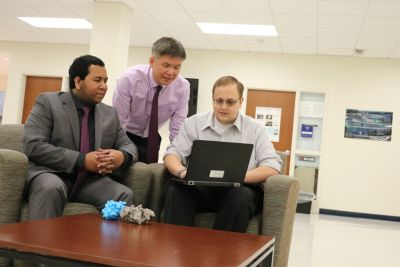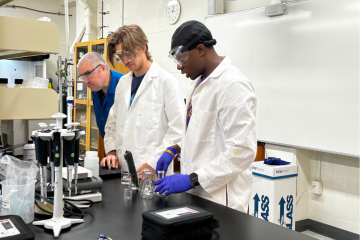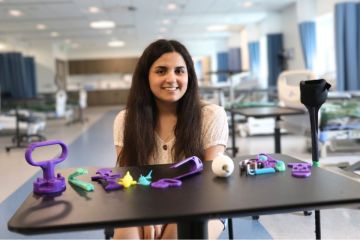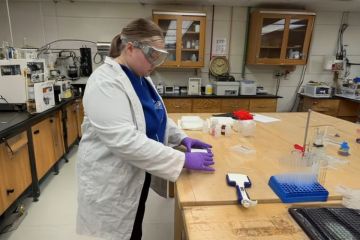From Patient to Researcher

Cancer survivor Jeremy Hofer wanted to dedicate his life to fighting the disease. But as a student studying computer science, he didn’t know how to pursue this passion – until he came to Widener.
After transferring to the university his junior year, Hofer joined a cutting-edge, faculty–student research team of chemical engineers and computer scientists that’s using computer simulations and laboratory testing to find and develop new cancer immunotherapy drugs.
“The fact that I have been able to contribute research in the fight against cancer – an illness that has had a significant impact on my life and the lives of many I have met over the years – is amazing,” said Hofer. “The research is a way to honor those who have lost their battles.”
Hofer also wants to ensure research like this continues, and recently took the fight to Capitol Hill. This spring, he was part of a Widener team that presented their work to members of Congress to advocate for federal investment in undergraduate research.
Hofer’s personal battle with cancer began in 2007. At age 14, he was diagnosed with Ewing’s Sarcoma, a type of cancerous tumor that grew on his right eye.
Hofer soon started a difficult regimen of surgeries, chemotherapy, and proton-beam radiation directed at killing the cancer. While the treatment was successful, the radiation therapy damaged his cornea, leaving him blind in one eye.
The ordeal left Hofer with a new perspective on life and a desire to give back.
Inspired by the nurses who supported him, Hofer initially pursued a nursing degree at another university, but soon realized his passion rest with computer science.
Hofer transferred to Widener’s computer science department, and immediately felt at home, forging strong relationships with faculty mentors.
Shortly into the curriculum, Hofer learned of a unique research opportunity to assist Sachin Patil, interim dean of the School of Engineering. Patil’s NanoBio Laboratory has been working to discover small chemical molecules that may be developed into inexpensive, yet effective, immunotherapy drugs to treat a variety of cancers. Immunotherapy drugs activate the body’s own immune system to fight abnormal cancer cells, and are far less toxic and invasive than traditional cancer treatments, such as surgery, chemotherapy, and radiation.
In the spring, Patil, together with chemical engineering students, co-authored a pioneering scientific journal paper on these findings. It was the first findings of this significance to be published in the world. Since then he’s had another paper on this cutting-edge topic accepted for publication this summer, with Hofer and others from engineering and computer science as co-authors.
“Our interdisciplinary team comprising chemical/biomedical engineers and computer scientists is using integrated approaches involving computational and experimental screening of the National Cancer Institute database molecules to find novel molecules that can help activate immune system against cancer,” said Patil. “Our unique screening approach has led to the discovery of several small-molecule drugs with potential to be further developed into effective cancer immuno-therapeutics.”
Hofer jumped on the opportunity to join this exciting research.
I thought ‘this must be a sign,’ because I never thought before about using computer knowledge for cancer research. — Jeremy Hofer '18
Undergraduate research experiences such as this add significant value to a Widener education and prepare students for their future careers, said Professor of Computer Science and Director of Faculty Research Development Suk-Chung Yoon.
“Jeremy has played a key role in the research project by showing leadership, as well as compassion in all that he takes on,” said Yoon. “Every undergraduate student at Widener should have an opportunity to work closely with faculty to advance his or her knowledge through research discoveries and then to present his or her findings to a national conference.”
And for Hofer, those opportunities also included the chance to present findings to federal lawmakers.
Along with Yoon and computer science major Abhay Aradhya, Hofer took part in this year’s Posters on the Hill, an event aimed at demonstrating to Congress the value of supporting the research that undergraduates are conducting on college campuses. The student presenters were chosen through a highly competitive process that involved more than 400 applications, judged by a national panel of experts.
Since returning from Washington, Hofer has celebrated even more accomplishments. He graduated Widener in May, will be 10-years cancer-free in June, and is pursuing work in the bioinformatics field.
He also plans to continue with cancer research.
“When I think back to 10 years ago, sitting in a hospital bed and undergoing cancer treatment, I realize it is big deal how far I have come,” Hofer said. “I made it through, but I still know several people who didn’t. That’s why I want to give back.”



